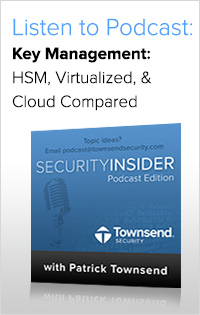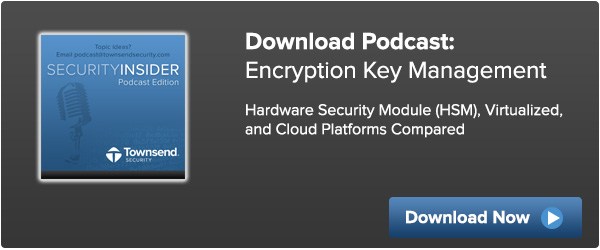With encryption and key management now being offered on a variety of hardware, virtualized, and cloud platforms, is it simply just a matter of preference or is one option better for you than another?
 Companies of all sizes now have options for securely protecting sensitive data using the appropriate security technology for their situation and industry regulations. Being responsible for the safekeeping of sensitive data like credit cards, social security numbers, or e-mail addresses, makes your encryption and key management strategy critically important. Once your sensitive data is encrypted, key managers are the specialized security devices that are designed to safeguard your encryption key (which is the secret that must be protected). Before deciding on how an enterprise should deploy an encryption key manager there are several questions to ask and factors to consider.
Companies of all sizes now have options for securely protecting sensitive data using the appropriate security technology for their situation and industry regulations. Being responsible for the safekeeping of sensitive data like credit cards, social security numbers, or e-mail addresses, makes your encryption and key management strategy critically important. Once your sensitive data is encrypted, key managers are the specialized security devices that are designed to safeguard your encryption key (which is the secret that must be protected). Before deciding on how an enterprise should deploy an encryption key manager there are several questions to ask and factors to consider.
What different device options are available to organizations needing an encryption key manager?
Hardware Devices
Today we have many options for key management solutions, including the traditional key management hardware security module (HSM), which is now more cost effective and easy to deploy than it was even five years ago. HSMs are network attached in your data center and accessed when encryption keys are needed. If your company has a physical data center and the infrastructure to support it, an HSM can still be your most secure option.
Cloud-hosted HSM
The cloud-hosted key management HSM functions in much the same way as the traditional security device. However, you do not need to have the infrastructure of a physical data center in order deploy or maintain the cloud-based HSM since it is hosted by the cloud hosting provider. Be aware of your cloud environment (is it shared or private?), and make sure to choose an option that provides real-time mirroring and redundant backups in geographically diverse locations.
Virtualization Options
Additionally it is now possible to deploy virtualized key management appliances. There is no hardware when you deploy a VMware or Hyper-v or Xen virtualized appliance inside your own virtualization infrastructure. A true cloud-based key management solution like VMware gives you a path to run key management solutions in vCloud either as standard cloud instance or virtual private clouds. Microsoft Azure and Amazon Web Service and other cloud platforms provide a mechanism for deploying virtualized key management appliances too.
What are some factors people need to consider when deciding which key management option is right for their organization?
Risk Tolerance
Risk tolerance is perhaps the main driving force for which of the key management options you might choose. If you're very risk-averse then probably you will want to deploy a hardware security module (HSM) in your own data center. If you have a moderate level of risk tolerance you might consider a cloud-based HSM hosted by a cloud vendor with appropriate security technology. A company dealing with small amounts of data might bear some additional risk and use a key management solution to help protect encryption keys in a virtual environment. Cloud or virtual solutions can be much more cost-effective and give enough protection for encryption keys to meet a lower risk tolerance level.
Compliance Regulations
Most compliance regulations give clear guidance on best practices about where encryption key management can and should run. Generally speaking, regulations are based on your industry and what type of sensitive data you store.
PCI Security Standards Council has issued Cloud Computing Guidelines as well as guidance around virtualization of data protection solutions, so you can be PCI compliant with a cloud-based key management and encryption solution.
Cloud Security Alliance (CSA) has issued good guidance around key management and cloud environments - version 3.
Other regulations are not yet providing concrete guidance,and in some cases it is best to confirm with qualified auditors and assessors to really understand whether or not you can be in compliance and deploy true cloud-based virtualized key management solutions.
Infrastructure
Your key management options are also based on where your data is stored. If you don't have a traditional data center, for example if you are using a software as a service (SaaS) solution, you may not have your own IT infrastructure or personnel with which to deploy a traditional encryption key management HSM internally. So the physical and organizational structure will come to bear in terms of the choices that you have around deploying key management.
Cost
Budget is always an important factor. As you consider various options, ask about endpoint licensing fees and make sure you have predictable maintenance costs as more databases/applications request key access. Remember to consider the costs of not properly managing sensitive data when doing the security cost benefit analysis.
Whatever option you choose, it is always wise to use key management best practices:
- Always separate the encryption keys from the protected data
- Use dual control
- Practice separation of duties
- Manage key rotation
- Look for NIST validations like FIPS 140-2
Please download our most recent podcast on Encryption Key Management Options to hear more about how to meet the challenges of running cloud or virtual applications where implementations are inherently shared, multi-tenant environments!

